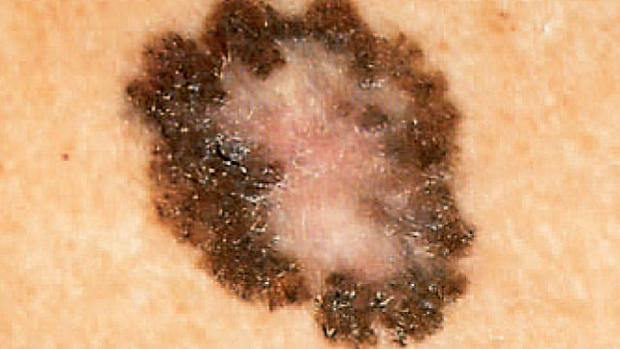Taking aspirin tied to protection against melanoma
Add protection from melanoma to the list of aspirin's potential health benefits.
New research shows that the cheap, chalky white pill taken by millions of Americans to stave off heart problems may protect against the deadliest form of skin cancer.
"There's nothing else that I know of that has as large an effect as what we're seeing with aspirin," study author Dr. Jean Tang, an assistant professor of dermatology at Stanford School of Medicine told NPR of his study.
Melanoma is a form of skin cancer of the cells that produce the pigment melanin, which is responsible for color of skin and hair. The cancer may begin as a mole or as a change in appearance of a mole that was already present on the body. An estimated 76,700 new cases of melanoma are expected in 2013 and nearly 9,500 people are expected to die from the disease this year.
Researchers at Stanford University School of Medicine in Palo Alto, Calif. analyzed data on 59,800 women who were enrolled in a long-running study where they were followed-up with after 12 years.
Women who used aspirin regularly had a 21 percent lower overall risk for developing melanoma after 12 years, compared with women who did not take aspirin.
The longer women took aspirin, the more protection was seen. Melanoma risk was reduced by another 11 percent with each incremental increase in the amount of time the women took aspirin, from less than one year of use, to one to four years of use, to five or more years of use. That means women who took aspirin for five or more years had more than 30 percent lower risk of developing melanoma than women who did not take aspirin.
The researchers' analysis ruled out other factors that increase melanoma risk such as differences in skin pigmentation, sunscreen use and tanning habits.
The study was published March 11 in the American Cancer Society's journal, Cancer.
"Aspirin works by reducing inflammation and this may be why using aspirin may lower your risk of developing melanoma," Tang explained in a written statement.
Another study in a May 2012 issue of the journal Cancerfound aspirin, ibuprofen and other nonsteroidal anti-inflammatory drugs (NSAIDs) reduced a person's risk of developing the three major types of skin cancer: basal cell carcinoma, squamous cell carcinoma, and malignant melanoma.
- Daily aspirin may increase risk for age-related blindness
- Aspirin may reduce risks for liver cancer, dying from liver disease
- Aspirin may be big help against some colon cancer, major study shows
Dr. David Agus, director of the Westside Cancer Center at the University of Southern California, told CBS This Morning the findings were "wild" because it was the largest look ever at melanoma prevention.
"Inflammation is at the root of diseases like heart disease and cancer," he said, explaining the recent spate of studies showing benefits for disease prevention. "This observation that this drug that's over 2,000 years old will lower the incidence of cancer is really profound."
Argus added that the study only looked at women but that doesn't mean the findings would not apply to men. He pointed out that aspirin can have side effects for some patients -- including an increased risk for bleeding in the gut -- so people should discuss taking aspirin with their doctor.
Dermatologist Dr. Michele Green, who practices at Lenox Hill Hospital in New York City, told HealthDay that she would urge some of her patients to take aspirin based on this study.
"I think it's fantastic. It's really a remarkable study," Green said. "If you have a family history of melanoma, I don't see any downside of taking aspirin for this."
